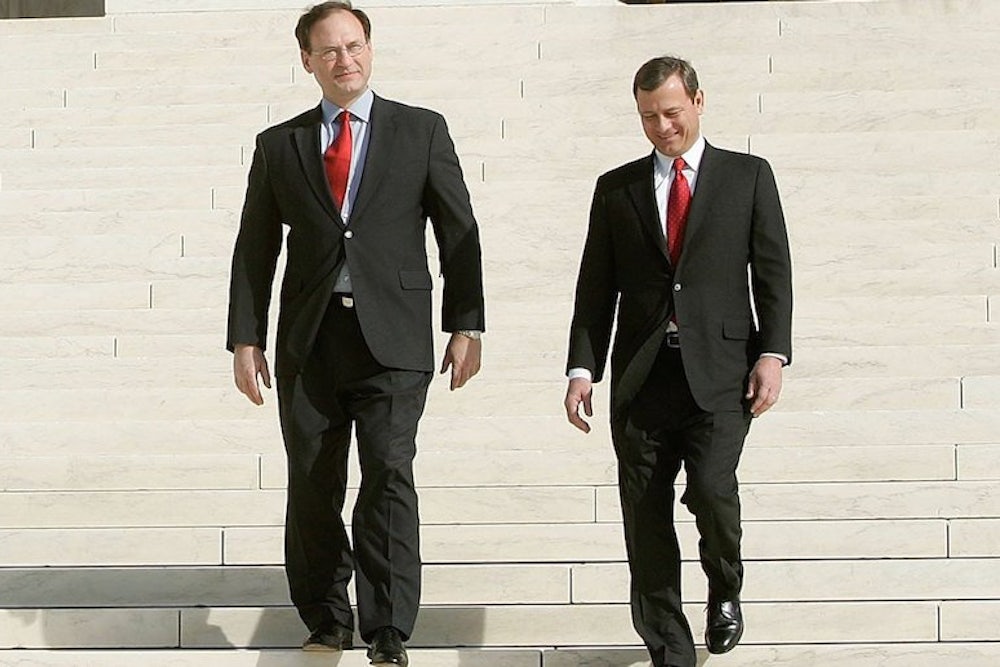Wednesday’s Supreme Court oral arguments made it evident that at least some conservative justices are worried about the disruption they’ll create if they rule for the challengers in King v. Burwell and void Affordable Care Act subsidies in 34 states.
The justices and lawyers themselves didn’t dwell on humanitarian costs, but those most hostile to the law repeatedly sought to downplay the consequences of an adverse ruling.
The plaintiffs’ lawyer, Michael Carvin, argued against all logic to incredulous liberal justices that eliminating subsidies wouldn’t leave states saddled with a punishing regulatory regime. Antonin Scalia got laughed out of court (sort of) for claiming Congress might step in to fix the problem. Samuel Alito even intimated that states might step in and establish their own exchanges. The Court could even lend them several months time to do so.
“It's not too late for a state to establish an exchange if we were to adopt Petitioners' interpretation of the statute,” Alito said. “So going forward, there would be no harm.”
If his suggestion was designed to appeal to skeptical conservatives, like Chief Justice John Roberts, and Anthony Kennedy, he may have harmed his own cause.
Alito’s comments evoke the image of many or most of the states that opted in to federally facilitated exchanges scrambling to reverse their decisions—to keep subsidies flowing and preserve the viability of their individual insurance markets.
That would stem the disruption. But it would also underscore the anti-federalist concerns Kennedy raised during oral arguments in dramatic fashion. What’s better evidence of coercion than sending a bunch of states into a blind panic to do something they weren’t originally inclined to do?
Supporters of the challenge might argue that the source of coercion in that case would be the disappearance of unauthorized subsidies, rather than the underlying scheme in the law. Essentially that this would all be the Obama administration’s fault. But Kennedy was explicit in his admonitions that the coercion problems with the challengers interpretation of ACA run deeper than money transferred by the federal government.
“The states are being told either create your own exchange, or we'll send your insurance market into a death spiral,” Kennedy said. “We'll have people pay mandated taxes which will not get any credit on on the subsidies. The cost of insurance will be sky high.”
To dull the implications of Kennedy’s concerns, conservatives enlisted Oklahoma’s Attorney General, Scott Pruitt, who banged out an op-ed arguing that his own state’s experience contradicts the premise that the ACA-as-written is unconstitutionally intrusive.
“Oklahoma knew the consequences of its decision but was not coerced into cooperating with implementation of the Affordable Care Act,” Pruitt wrote.
The argument lacks credibility coming from someone who adopted his position, on the advice of conservative activists, precisely because “in states that have not established their own exchanges, the structure of the ACA will crumble.” Seeking Pruitt’s guidance on the ACA’s impositions on states is a bit like taking flight lessons from a kamikaze pilot.
But Pruitt’s point also doesn’t allay Kennedy’s substantive concerns. His interpretation of the ACA arose not from its plain text, but, again, from the input of meddling activists trying to destroy Obamacare. It doesn’t follow from the fact that Pruitt is keyed in to conservative movement strategy that the ACA provides states clear notice that its subsidies come with major strings attached. Moreover, Kennedy’s problem isn’t just with states responding to the threat, but with the threat itself. “If petitioners' argument is correct,” Kennedy said, “this is just not a rational choice for the states to make.” In other words, even if several states continue to resist ACA implementation after an adverse ruling, there’s still a problem here, because the federal government shouldn’t be allowed to confront states with such onerous choices in the first place.
Assuming Kennedy meant what he said about coercion, he has several options, most of which augur well for the ACA. He could allow the challengers’ anti-federalist construction of the law to guide him to a better available interpretation (i.e. the government’s). He could determine that the challengers’ construction should be avoided in favor of one that isn’t unconstitutional. He could essentially rewrite it, as the Court rewrote the ACA’s Medicaid expansion, to sever the offending phrase. Or, less auspiciously, he could find for the challengers, and leave the subsidy condition on the books, anticipating that a constitutional challenge will arise as a result.
But the fact that Alito and Scalia assumed a ruling for the challengers would send political actors scrambling for a fix doesn’t advance their ends with anyone concerned about coercion. It actually just proves the point.
